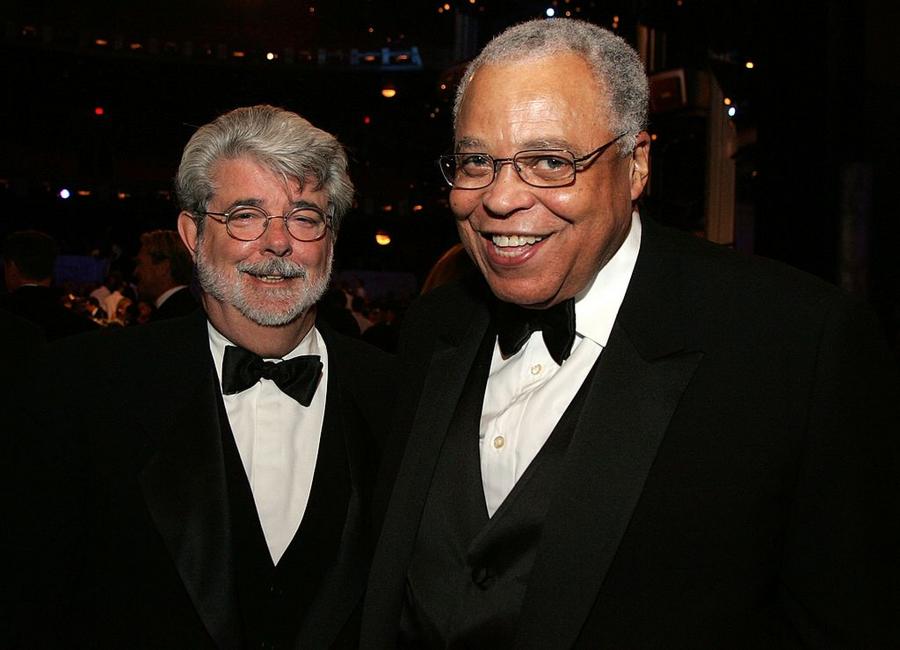On a fateful day in March 1977, James Earl Jones walked into a recording booth at Goldwyn Studios in Hollywood to lay down lines for a low-budget, futuristic space movie called Star Wars. He didn't know it at the time, but those recordings would eventually turn him into one of the most recognizable voices in American film history. By the end of the day, he had laid down all of the voice-over tracks for a character named Darth Vader. Darth Vader had to possess a voice of pure menace: low, gravelly, and with each syllable delivered with the intonation of a death sentence. The actor who played the physical role of Darth Vader did not have a voice that could meet these requirements. The film's young director, George Lucas, originally wanted to hire Orson Welles for the voice of Vader, but Orson's voice was deemed "too recognizable." So, Lucas and the studio called up Jones' agent and said: "Hey, does Jimmy want a day's work?"
Jones never actually appeared on-screen. At the time he recorded the vocal tracks, Jones saw his role in Star Wars as minor at best. At his own request, he was not credited in the first two movies, A New Hope and The Empire Strikes Back. He considered his role parallel to that of the voice actor Mercedes McCambridge, who recorded the voice of the devil in The Exorcist. In the credits, Mercedes was simply listed as part of the special effects team.
At the time, Star Wars was being produced on a shoestring budget. Furthermore, thanks to a series of production disasters, absolutely no one believed the movie ever had a shot at being a hit. Even the movie's own studio and starring actors were totally convinced it would flop. When Jones was first approached about providing his voice work, production was spiraling over its modest budget. In order to save costs, George Lucas offered to give Jones points instead of salary for his role. Points are like equity in a company… basically shares in the movie's future profits, assuming it ever makes a profit.
Jones was dead broke at the time and, like everyone else involved at that point, was extremely skeptical of this silly space movie. So, in what might be one of the most regrettable decisions in film history, he rejected the points offer and demanded to be paid in cash… upfront. His full salary for the first Star Wars movie ended up being a grand total of $7,000. That's equal to roughly $27,000 today after adjusting for inflation. Not a bad haul for a few hours of work in a recording studio. Especially for an actor struggling to pay the rent. But if only James Earl Jones had believed a little more strongly in The Force! Decades later, Jones would explain his thought process at the time:
"$7000 was big money for me in those days. I was broke and needed the money to pay rent and buy groceries!"
As we all know now, Star Wars went on to become a massive international smash hit and cultural phenomenon, earning $775 million at the worldwide box office. The movies were so successful that they eventually turned George Lucas into a multi-multi-billionaire.

(Photo by Mark Mainz/Getty Images for AFI)
So, how much did James Earl Jones give up?
In a 2010 interview on Live! With Regis and Kelly, Jones admitted that the decision to take cash instead of points eventually cost him "tens of millions of dollars." It was probably much more than that when you take inflation into account.
To give you an idea of just how much James gave up, consider the counter-example of Alec Guinness, who played Obi-Wan Kenobi in the first film. Guinness DID elect to take a percentage of box office earnings as part of his contract (even though he too was skeptical about the film's potential). Unlike what Jones was offered, Guinness demanded a slice of every future Star Wars film. To date, this decision has resulted in payouts of over $10 million for his estate and heirs.
On the bright side, after his iconic role as the voice of Darth Vader in Star Wars, James Earl Jones' career flourished. His distinctive voice became highly sought after, leading to numerous high-profile voice acting jobs, including the beloved Mufasa in Disney's "The Lion King" and the tagline "This is CNN" for the news network.
Jones continued to excel in both film and theater. He appeared in successful movies like "Field of Dreams" and "The Hunt for Red October," showcasing his on-screen presence. On Broadway, he remained a formidable force, winning a Tony Award for "Fences" in 1987 and continuing to perform well into his later years.
His career was marked by versatility and longevity. Jones took on roles in television series, lent his voice to commercials, and narrated documentaries. He received numerous accolades, including Emmy Awards and a Lifetime Achievement Oscar, cementing his status as one of the most respected actors of his generation.










 Bengali (BD) ·
Bengali (BD) ·  English (US) ·
English (US) ·